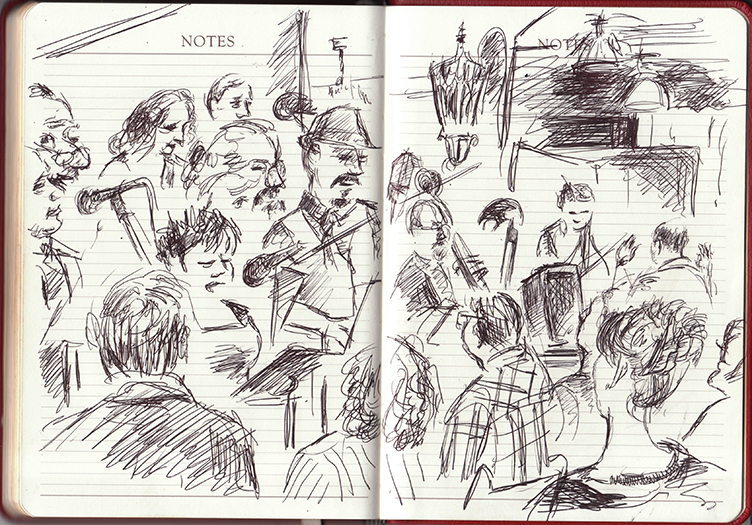It came together.
It came together with the modern orchestral pieces by Seth Boustead and Amos Gillespie of Access Contemporary Music. It came together with the scripts by Anderson Lawfer, Mike Dailey, Aly Greaves Amidei, Anita Deely and Sean Mallary. It came together with the sound effects by Starr Hardgrove and Jack Rubin. And it came together with the narrations by the Strawdog Theatre troupe, too many to name here.
What came together was the 1001 Afternoons in Chicago stories of old Ben Hecht.
It was a live radio play of Ben Hecht stories performed at Architectural Artifacts, a storehouse of treasures and knick knacks claimed from buildings about to be torn down around the world. The setting was as much a beautiful hodge-podge as the 1,001 tales the Chicago Daily News writer tried to cobble together about the cops and crooks, tourists and drunkards of 1920s Chicago.
A CD and a film are coming, Boustead said.
“I know when I’ve got something good on my hands and we’re going to run with it,” he said as the crowd milled after Tuesday’s performance.
During the show, the five-piece ensemble Palomar performed original pieces under conductor Francesco Milioto. Boustead and Gilespie crafted the pieces to match radio play versions of Hecht stories crafted by Lawfer, et al., and read live by Strawdog members.
A jazzy rag played under Steve Herson’s fast-talking con man from “Dapper Pete and The Sucker Play.” The music took an Eastern European bounce as Conor Burke’s Sam Sklarz talked about Turkey and Persia during “Don Quixote and His Last Windmill.”
In the chaos of voices and music and sound effects and a laughing, sighing audience on the bottom stage area of three and a half floors of reclaimed treasure from buildings about to be torn down around the world, it all came together.
And it was beautiful.
“There’s some things we’re going to tweak, some things that didn’t work out, some things that didn’t line up right, some sound effects we want to change — there’s always going to be things like that, invariably,” Boustead said.
“Even some stuff that didn’t line up right, I was like, ‘That might be better, actually,’” he added, laughing.
Boustead first heard about Hecht six years ago from a dance troupe who wanted him to score a performance based around the tales.
Cellist Alyson Berger played with the original “1001 Afternoons in Chicago” performance with the dance troupe and with the radio play Tuesday night.
“This one, it made more sense. It brought the stories more to life. The other one was through interpretive dance and I don’t know if that’s really my thing,” she said, laughing. “The stories are so interesting that I want to hear all the details.”
Although both 1001 performances were scored by Boustead and Gillespie, the music was completely different, Berger said.
“Seth’s was a little more lively in the dancing one,” she said. “It was definitely more lyrical for the spoken word one. I guess the dancers wanted it more rhythmic.”
Berger stood by a barroom Architectural Artifacts seized from somewhere. It wasn’t, but could have been the bar where Sam Sklarz spread his wealth in “Don Quixote and His Last Windmill.” It was up against the wall next to a person-sized clock face that could have been but wasn’t the one from Hecht’s “Clocks and Owl Cars” that always said “six.”
On the wall behind the cellist, a giant stone face from a building facade was propped leering. Garish and deco, like one of Herman Rosse’s grotesques from his illustrations for the “1001 Afternoons in Chicago” book that came out in ’22.
It all came together.
Read part 2, the scriptwriters
